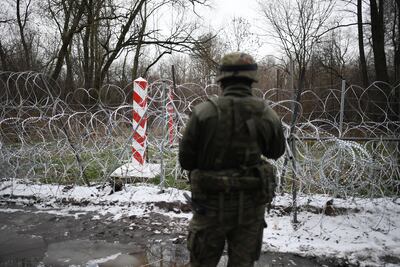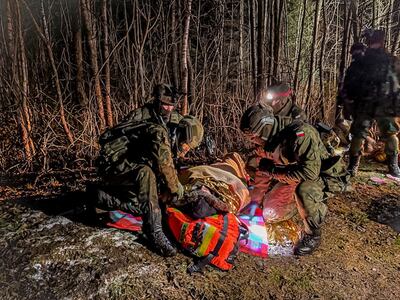UN investigators said on Tuesday they were denied access to the sensitive border between Poland and Belarus, where watchdogs are warning of "dire conditions" for stranded migrants.
A UN rights office team travelled to Poland late last month but "was not granted access to the restricted border area", while Belarus denied a request to visit, said spokeswoman Liz Throssell.
"We urge the authorities of both countries to allow access to the border areas ... and to stop practices that put refugees and other migrants at risk."
The UN announcement came after new testimony published by Amnesty International claimed migrants stranded on the border had been beaten with batons, punched with knuckle dusters and threatened with security dogs.
It adds to concern for the welfare of people caught in the months-long geopolitical stand-off in Belarus. At least 13 people are thought to have died in the harsh conditions.
Border guards on both sides have come in for criticism, with Belarusian security forces accused of extorting money and stealing phones people allegedly lured to the border by the regime in Minsk.
Without access to the border, the UN team interviewed 31 people who arrived in Poland and described "dire conditions on both sides", Ms Throssell said.
She urged both countries to "urgently address this appalling situation in line with their obligations under international human rights law and refugee law".
Investigators heard reports of people being pushed back and forth across the border, having to pay extortionate sums for food and water and having limited or no shelter in freezing temperatures.
Most of those approached by the UN described being beaten or threatened by security forces on the Belarusian side, she said, corroborating Amnesty's evidence.

Guards allegedly beat the migrants after driving them to the border in a military lorry and setting dogs on them to hurry them over the freezing border into Poland.
“Some had iron finger boxing rings and steel-tipped boots,” a Kurdish migrant from Iraq was quoted as saying by Amnesty.
“They kicked us while we were lying on the ground. They made us hand over money and phones. My body was left black and blue.”
Authorities across the border in Poland are also in the firing line, with guards accused of pushing people into a river to force them to wade back into Belarus.
Both sides have been accused of blocking access to the border area for humanitarian groups and independent journalists.
People at the border “find themselves between a rock and a hard place”, said Amnesty migrant rights researcher Jennifer Foster.
“Thousands of people – including many fleeing war and conflict – find themselves stuck in Belarus in the depths of winter in extremely precarious conditions. Instead of receiving the care they need, they are subjected to brutal violence.”
Amnesty said its claims were based on interviews with 75 people who travelled to Belarus, most of whom were Iraqi and some of whom recounted experiences endured by others.
Some of them spoke from Iraq after special flights were arranged back to the Middle East for migrants denied entry to the EU.
Other migrants were moved to a warehouse on the Belarusian side of the border, near the fenced-off border strip described by Amnesty as an “exclusion zone”. Humanitarian concern has grown as cold weather draws in.
“We were almost unconscious sometimes and were hungry and thirsty and couldn’t find any help, neither from Polish soldiers nor the Belarusians,” said a Kurdish Syrian father who stayed in the fenced-off area for almost three weeks.

Thousands of people have tried to enter the EU via Belarus since the summer, on what was previously a practically unknown migration route.
Belarus and Poland blame each other for the crisis, with Warsaw joining the EU, UK and US in accusing Minsk of orchestrating the flow of migrants.
President Alexander Lukashenko’s government has been accused of engineering the crisis to retaliate against sanctions linked to political repression at home.
“They offloaded us ... There were about 10 soldiers and they had four dogs with them,” a Syrian man was quoted as saying, describing the Belarusian troops.
“They said they would let the dogs loose so if we didn’t run fast, we would get bitten. The soldiers ran after us beating anyone who didn’t run fast enough with batons.”
The Belarusian government denies ferrying people to the border, and suggests the EU should take in some of the migrants if it wishes to ensure their welfare.
Poland says it is the victim of “systematic information warfare” coming from Belarus and Russia and unfairly portraying it as putting the migrants at risk.









